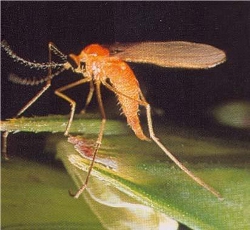Insect pest long confined to Boundary County spreading
 An
insect pest that has been reliably confined to
Boundary County for 20 years has been discovered
in three Washington counties, according to
Washington State University scientists.
An
insect pest that has been reliably confined to
Boundary County for 20 years has been discovered
in three Washington counties, according to
Washington State University scientists.
WSU Extension agronomist Diana Roberts, Spokane,
said that the insect, which damages spring
wheat, has been found in low numbers in
pheromone traps in Spokane County's Peone
Prairie and in Lincoln and Garfield Counties.
Roberts said close examinations of wheat fields
in the area have not revealed populations likely
to cause economic damage, and she said farmers
should not apply insecticide unless they know
they have an infestation, as pesticides can kill
beneficial insects.
According to the release, spring wheat crops are
most susceptible to egg-laying infestations by
the midge from the time the wheat heads until
anthers hang out of the florets. After that
time, the midge causes little damage. Winter
wheat and barley crops are seldom affected.
The adult midge is a fragile insect that
resembles a mosquito, but about half the size.
It has an orange body, conspicuous black eyes,
long legs and one pair of wings. The female
needs warm, calm weather and moisture for
successful egg laying, and lays her eggs on the
awns and heads of wheat plants. The eggs hatch
into larvae that crawl inside the floret and
feed on the developing grain, causing yield loss
and shrunken kernels. The larvae are about the
same size, shape and color as the anthers of the
wheat floret.
"Care should be taken to ensure identification,"
Roberts said. "There is a lookalike fly that has
an orange but fat body, and it rests head
downward in the wheat."
According to the website,
www.beyondagronomy.com, wheat plants have a
natural control mechanism called ferulic acid
that begins at flowering and will kill midge
larvae that have hatched inside the developing
kernel. Another natural control mechanism is the
buildup of natural predators at the time of
flowering. The numbers of natural predators like
parasitic wasps tends to coincide with start of
flowering.
"Unfortunately, those who are spraying for
"revenge" will only wipe out the beneficial
insects and not provide the control they're
looking for," they wrote. "This will only serve
to increase levels of midge next year as their
natural enemies have been destroyed."
Tips to remember about wheat midge:
- One midge per 4 heads can reduce yield by 7.5%.
- Scout fields from late boot until early flowering.
- Scout fields from 9:00pm until 10:30pm with temperatures above 15 degrees Celsius.
- Threshold is 1 midge per 8 heads to protect grade.
- Threshold is 1 midge per 4 heads to protect yield.
- Wait three days after midge threshold has been reached to apply an insecticide.
- Flowering (anthesis) starts in the middle of the head and progresses outwards.
- Flowering takes approximately 3 to 4 days to finish and 7 to 10 days in cooler weather.
- Cost of control is approximately $16 an acre including application.